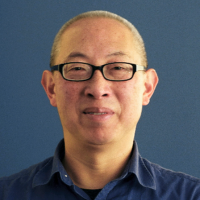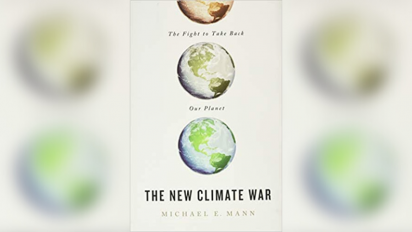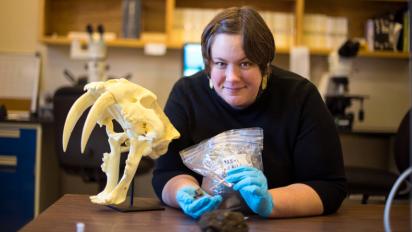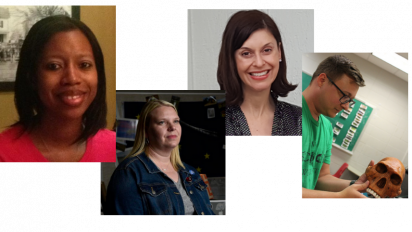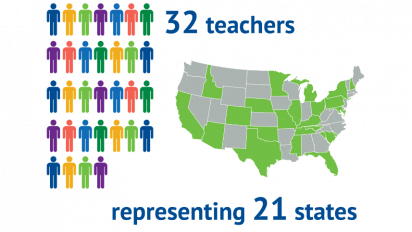NCSE Teacher Ambassadors Take On a New Challenge: Mentorship
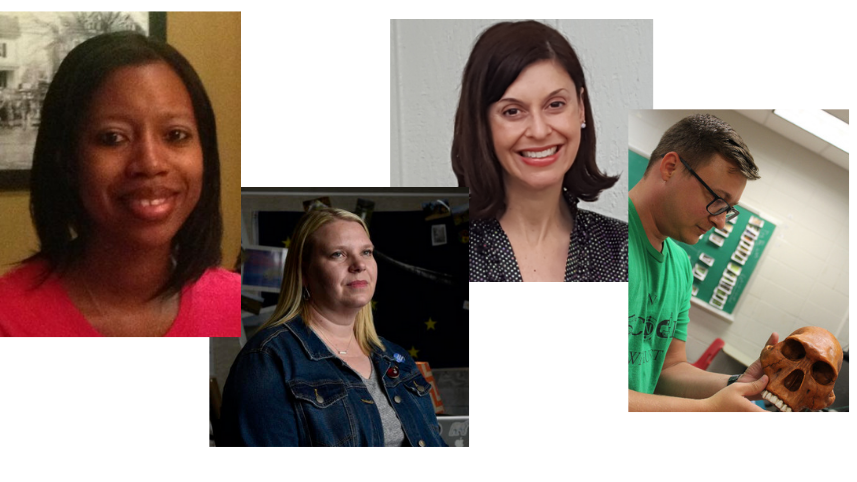
We ask our teacher ambassadors to do many things on behalf of NCSE and accurate science education: talk to the press, develop lessons, and lead professional development for colleagues. And to all these requests, they invariably and cheerfully say, “Yes!”
Most recently, we asked a group of experienced teacher ambassadors — master science teachers who have been collaborating closely with NCSE for the past several years — to act as mentors to a group of 32 teachers from across the country who are field-testing our soon-to- be-minted climate change, evolution, and nature of science lessons. (Read more about this two-year curriculum study.) Recently, we spoke to several of them about their role as mentor, how they plan to leverage their wealth of knowledge and experience to support their colleagues, and what they hope the curriculum study will accomplish.
First and foremost, the mentors want to help the curriculum study participants understand and effectively implement the curriculum, developed with the aid of many of the mentors themselves. “Just creating free quality resources and posting them on a website doesn’t translate into the lessons reaching students in the classroom,” explains Melissa Lau, a chemistry teacher in Piedmont, Oklahoma. “Teachers need training and support to be able to successfully and confidently facilitate new curriculum.”
Just as importantly, the mentors recognize that they are in a position to learn from this new cohort of teachers. “I am going into this to help guide other teachers through the curriculum study process, but I am also fully expecting to learn just as much from them,” says Blake Touchet, a dual enrollment biology and environmental science teacher in Maurice, Louisiana. “Mentorship is much more about collaboration and active problem-solving than anything else.”
The curriculum study “will be the start of a long-lasting, widespread movement that builds a network of science teachers who are confident in tackling climate change, evolution, and the nature of science.”
The mentors are also supporting the curriculum study teachers as they gather data on the efficacy of the lessons and report back results. Based on this information, NCSE staff, the mentors, and the cohort of teachers will revise the lessons to better meet the needs of students and ensure that the lessons are aligned to the Next Generation Science Standards. In the second year of the study, the cohort of teachers will implement the revised lessons to determine whether the changes lead to improved outcomes. In this way, adds mentor Rebecca Brewer, an Advanced Placement biology teacher in Troy, Michigan, “The curriculum study is essential for NCSE to promote our educational resources as NGSS-designed and effective.”
The teacher ambassadors recognize that the curriculum study participants will have many questions — and, perhaps, many concerns, such as whether the NCSE lessons will fit within their scope and sequence and pacing guide for the year. “These are concerns that I think the mentors at NCSE can help to address,” Touchet says. “For instance, we created these units to fully address the evolution and climate change standards that teachers need to cover, which means that they will use these lessons in place of, not in addition to, their traditional units.”
In this first year of the study, all professional development meetings and mentor- ing sessions will happen online, continuing a practice that Brewer says most teachers are now very much comfortable with. Regardless of the medium, Touchet observes, the most critical element for success in mentoring is effective communication “that is conducive to both sides asking questions, giving feedback, and troubleshooting solutions together.” The mentors, in fact, all see their role as one of relationship building. “This will be an amazing opportunity to collaborate and help to inspire others in the awesome work they are already doing,” says LaStelshia Speaks, a special education teacher in Baltimore, Maryland. Brewer plans to encourage the curriculum study teachers to “step outside of their comfort zones” while also being a cheerleader for their successes. And Lau says she hopes to “bring an empathetic and encouraging voice” to the teachers as they implement the NCSE lessons.
Ultimately, Touchet speaks for the entire group of mentors when he says he hopes the curriculum study “will be the start of a long-lasting, widespread movement that builds a network of science teachers who are confident in tackling climate change, evolution, and the nature of science, collaborating with one another across the country, and communicating complex scientific ideas both within their classrooms and out in their communities.” He adds, “I think the team at NCSE is in a good position to lead this movement to support teachers and develop them into leaders of science communication within their local spaces.”
This article has been modified slightly from its original print version.

